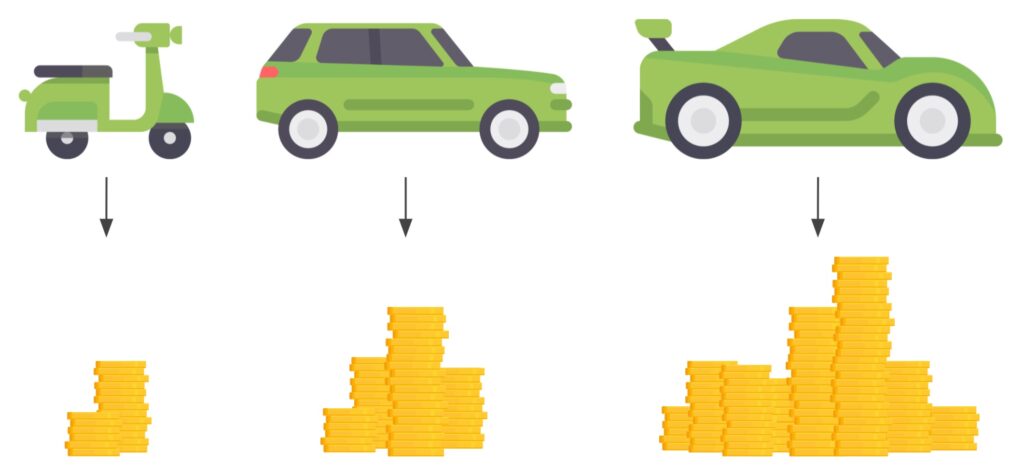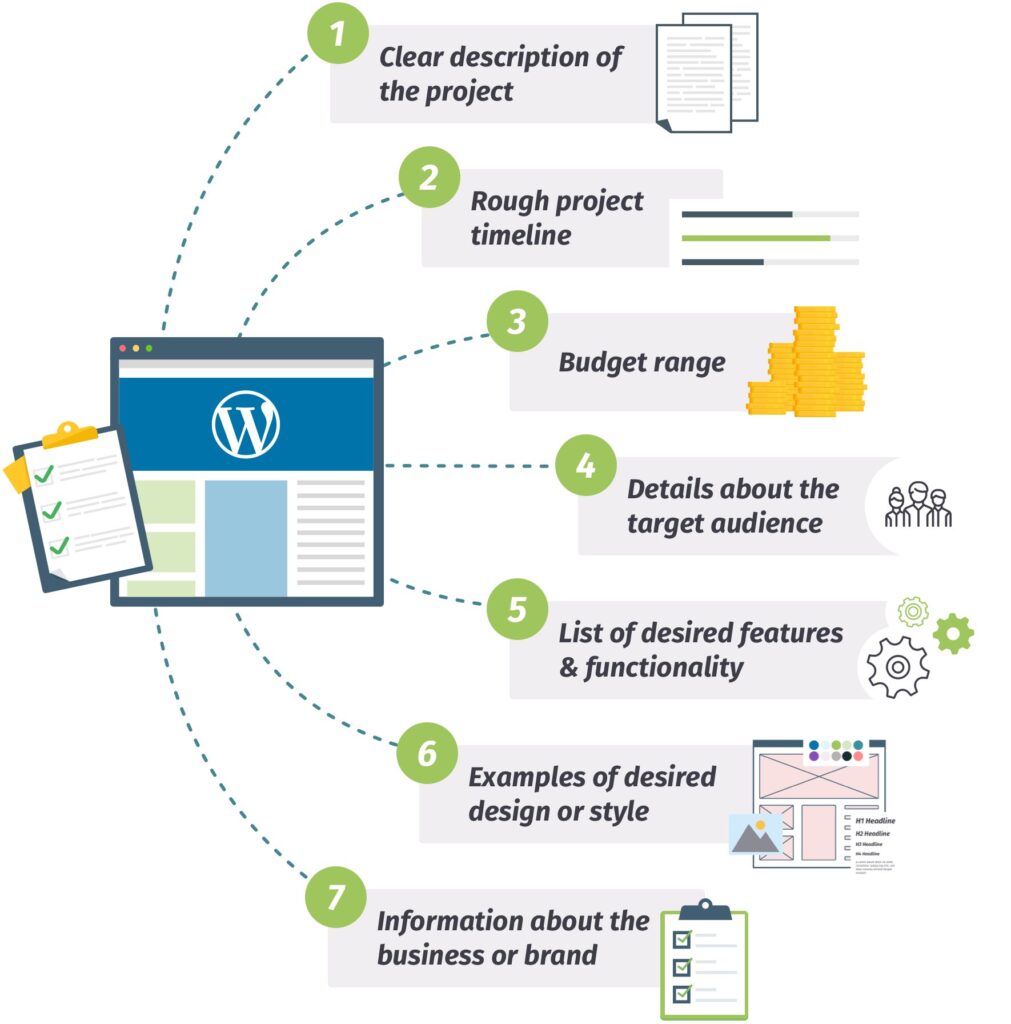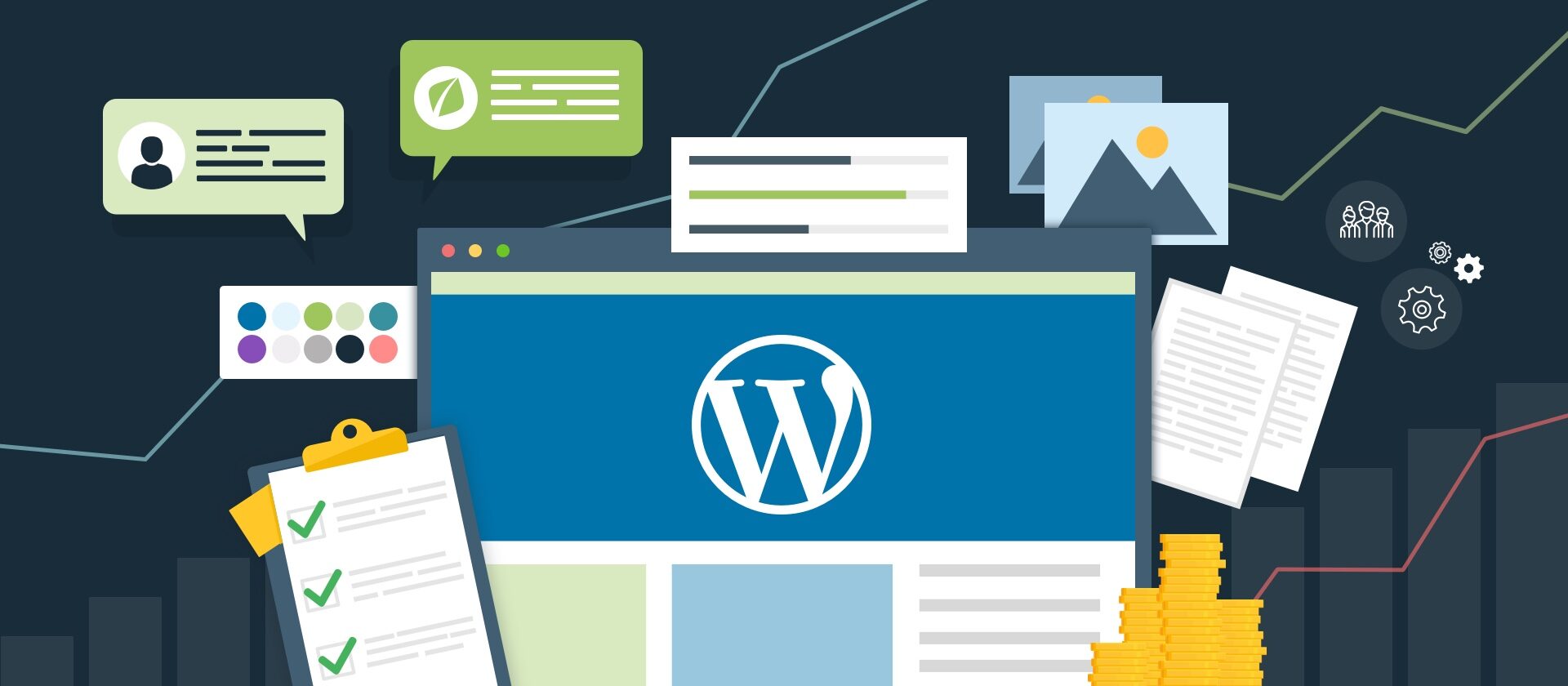Writing an Agency Briefing and sending it out to finally kick off the new website project is an exciting but also daunting task. When requesting a quote from a website development agency, having all the necessary information and details is essential. By providing a clear understanding of your project goals and objectives, budget, target audience, desired features, and design preferences, you’ll be better equipped to receive a more accurate and comparable quote.
This post shares 7 key elements to consider when requesting a website development quote to ensure you’re well-prepared and can make an informed decision on the right agency for your project. From outlining the project’s scope to providing an overview of your business, these tips will help you get the best quote for your project!
How to write an awesome agency brief
As a pure WordPress agency, we have been doing professional web development since 2006, and in that time, we have had thousands of requests for quotations. We learned from all of these inquiries and emails that it tends to be pretty hard to answer them with a quotation the potential customer can use for comparison.
Most agency briefings and proposal requests we get lack the information we need to hand out a serious and professional proposal – including a comparable price. We understand that clients need something to compare different agencies and solutions with each other and that a price is quite handy. However, we believe that in most cases, it would be untrustworthy to answer just with a price.
A website can cost 10.000€, it can cost 100.000€, or it can even be a 1 million Euro website. This is due to technical requirements, timelines, and how features are implemented varying vastly from project to project.
Comparing a 10k with a 100k proposal would be like comparing apples to oranges. The agencies in the pitch are talking about entirely different website projects, all based on the same briefing. We like to explain this with a little metaphor. Buying a website isn’t entirely different from buying a car.
How much does a car cost?
If we just go to our local car dealership and brief them with the words, “we want to buy a green car,” we find ourselves looking at many cars that are not in our price range or relevant to us. We first have to define our total budget, interior equipment (e.g., cheap or expensive radio), horsepower, or extra features (e.g., parking assistant, navigation system). In a nutshell: We have to narrow down our requirements and the range of possibilities to get the right offer.
Many potential clients don’t even ask for a “green car” when talking about websites. They ask for a “green vehicle” or “green transportation.” That is how they end up with such an extreme disparity of offers. It could be a green Scooter, which gets them from point A to B but is a questionable minimum viable product.
The offer could be for a green compact car with or without extra features (the standard and a bit more). Or a limousine, what they asked for but more expensive. And sometimes, it can be a green racing car with many bells and whistles and more power than they may not even need.

As a result of such agency briefings, clients have to deal with a vast price range, and it’s hard to tell from only a few pages why the offers are so different. In the worst case, they choose the cheapest option and accept an offer that doesn’t meet the requirements, or they start building the website while the project gets bigger and bigger over time, creating a lot of trouble and higher costs than expected.
Read more: Different agency pricing modules and how to select the right one.
Potential risks of imprecise agency briefings
Getting a comparable quote from an agency is one thing. Basing a website project on a wrong estimate is a completely different thing.
This is an unfortunate result of an incomplete agency briefing. Requirements are under or overestimated or completely forgotten because they have not been identified in the first place.
If project risks are not identified beforehand and estimates are not done carefully, there are a few potential consequences that could occur:
- Cost Overruns: Without proper risk identification and accurate estimates, the project’s cost could exceed the budget. This can lead to financial constraints and the need to cut corners, which can negatively impact the quality of the final product.
- Delayed Timeline: Unexpected issues could arise during the project without proper risk identification, which can cause delays. These delays can lead to missed deadlines and a longer time to complete the project.
- Quality Issues: Important aspects of the project may be overlooked or undervalued without accurate estimates. This can lead to a final product that doesn’t meet the desired quality standards.
- Decreased ROI: If project risks are not identified and estimates are not done carefully, the return on investment (ROI) may not be as high as expected. This can lead to a decrease in profitability and potential revenue loss.
- Unsatisfied Client: If the project’s budget is exceeded, the timeline is delayed or the quality of the final product is not as expected, the client will likely be dissatisfied with the outcome. This can lead to negative reviews, a damaged reputation for the agency, and the loss of future business.
Identifying project risks and providing accurate estimates to mitigate these potential consequences is crucial. By identifying risks and creating accurate estimates, a website development agency can provide a more realistic timeline and budget, leading to a more successful project and satisfying clients.
This brings us to the point: What actually needs to be done to write an awesome agency briefing that leads to a comparable offer from a web agency?
The 7 Key Elements to consider when writing an agency briefing

When sending out a briefing to a website agency to get a quote, the following information should be included or at hand when having the first meetings:
- A clear description of the project: The client should have a clear understanding of the goals and objectives of the project and be able to communicate them to the agency. This will help the agency understand the project’s scope and provide a more accurate quote.
- A rough project timeline: The client should know when they want the project to be completed, so the agency can understand potential time constraints and plan accordingly.
- A budget range: The client should have a rough idea of their budget for the project, so the agency can understand their financial range and provide a quote that fits within those constraints.
- Details about the target audience: The client should have information about the target audience for the website, including demographics, location, interests, and behaviors. This helps the agency recommend and suggest the best approach for design and functionality.
- A list of desired features and functionality: The client should have a list of specific features and functionality they would like to see on the website, including an e-commerce platform, a custom form, or an integration with a CRM system.
- Examples of desired design or style: The client should have examples of design or style they would like the website to emulate. Examples can include links to other websites or images that showcase the desired aesthetic.
- Information on the business or brand: The client should provide an overview of their business or brand, including their mission, values, and target market. This helps the agency understand the project’s context and make design and functionality recommendations that align with the client’s goals.
Having this information prepared helps the agency understand the client’s specific needs and provide a more accurate and comparable quote. But it takes some time and patience.
Why a good website estimate takes time
Even with the world’s best and most comprehensive agency briefing, putting together a proposal is time-consuming. Understanding that an accurate estimate requires a thorough understanding of the project scope and its specific requirements is crucial.
A website development agency needs to consider the design and development aspects and the website’s testing, deployment, and maintenance. All this takes time; a good website development agency will spend the time to understand your business, your goals and objectives, your target audience, and your desired features and functionalities. Additionally, a website project can be complex and requires significant planning, research, and preparation.
It’s not uncommon for a project to take up to six to 12 months internally before clients have enough clarity to send out the brief and reach out to agencies. Depending on the project’s difficulty, agencies also need a couple of weeks or even months to discover the requirements of a website project, especially in the enterprise market.
This time is used to gather all the necessary information, plan the website’s structure, and ensure that the project’s goals and objectives are aligned with the overall business strategy.
As a result, the agency can provide a more accurate and realistic estimate, which will take into account all the necessary steps required to deliver a high-quality website that meets your specific needs. This is why it’s important to provide as much information as possible in the briefing and be upfront about the budget and timeline when requesting a proposal.
A Requirement Workshop speeds up the proposal process
This preparation can be pretty daunting, and sometimes resources, time, or knowledge are unavailable to write a comprehensive agency briefing for your website project. We are happy to help and discover your project in a joint workshop!
A joint workshop is a great way to create a comprehensive and detailed requirement document that can be used as the foundation for the project. This document should outline the project’s scope, goals and objectives, target audience, design preferences, and desired technical features. A clear and well-defined requirement document is crucial to get comparable offers from other agencies. By providing this document to multiple agencies, you can ensure that you receive quotes based on the same set of requirements and can make a more informed decision when choosing the right agency for your project.
On top of those general aspects, you must consider the possibility of many project-specific detailed technical requirements. A first glance may not answer all these questions; this is not a complete list either. But as a good starting point, the following questions will help narrow things down a bit:
- How extensive is the menu/sitemap? How many main pages/subpages do we need?
- What is a clear structure for our website? Is it user-friendly?
- What web design elements shall be integrated into the website (e.g., sidebar, buttons, image slider, gallery, blog)?
- Does the agency consider building the website with a responsive design? Is it included in the core tasks?
- Shall we embed videos and social media platforms on our website?
- Do we need to implement external services for marketing functionalities (e.g., Google Analytics, Piwik)?
- Do we manage our web content (text, graphics) by ourselves, or shall we outsource it? Need our staff to be trained?
- Do we need a contact form?
- What’s the extent of our imprint?
- What else shall we keep in mind regarding agency services, i.e., page-load speed optimization, browser optimization, SEO, logo design, training and/or manual, QA, and support?
It’s also worth noting that transparency and open communication are important when working with an agency, and having a clear requirement document is a great way to ensure no confusion or misunderstanding about the project scope and objectives. We even encourage companies we are talking with to take this document and request quotes from other agencies. Showing that we have nothing to hide and are open to competition demonstrates that we value excellence in consulting. This is a great sign for the agency and will likely get more trust in the working relationship.
Are you ready to send us your brief now?
In conclusion, requesting a quote from a website development agency can be complex. Still, by keeping in mind the 7 key elements discussed in this post, you’ll be better equipped to communicate your needs and receive a more accurate and comparable quote.
Remember, being prepared and providing clear information about your project goals, budget, target audience, desired features, and design preferences will help the agency understand the scope of your project and provide a tailored quote that fits your specific needs.
In order to make your quote request process as smooth as possible, we recommend using our agency’s quote request form. You can access the form by clicking here; it’s easy to use and will help us with all the necessary information for the project. Don’t hesitate to contact us, and let us tackle your project together!

Failed to submit:
one or more fields are invalid.